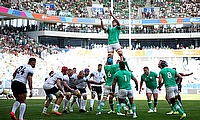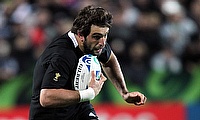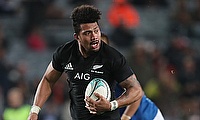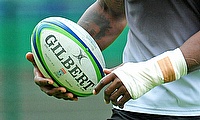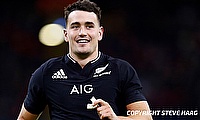Kiwi Super Rugby dominance highlights the difficulty facing the B&I Lions
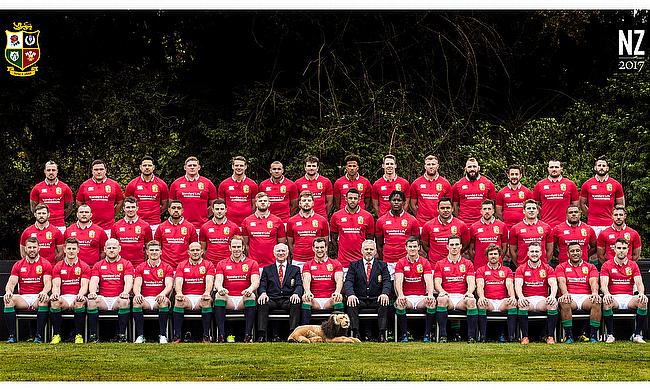
The British and Irish Lions squad (minus Billy Vunipola)
©British and Irish Lions
In much the same way that until the Lions turn out against the New Zealand Provincial Barbarians on Saturday June 3, we have little-to-no idea how effectively the team will play together, gauging the current form of the Lions’ test opponents, the All Blacks, is similarly difficult.
New Zealand, of course, are reigning back-to-back world champions, the hitherto undisputed best side in the world and the favourites going into this summer’s test series. It’s hardly sticking one’s neck out to say New Zealand will be a fearsome matchup for the British and Irish Lions and probably take at least two out of the three test victories on offer.
Fortunately (or unfortunately depending on one’s perspective), the Lions have a gruesome warmup schedule to surmount before the first test against the All Blacks in Auckland on June 24th, a schedule that sees the tourists play six fixtures in seventeen days across both of the country’s islands. The silver lining is that the tour schedule offers the Lions a plethora of opportunities to come together as a cohesive team, a necessity given the 41-man’s squad diverse origins across club and country.
Conversely, the All Blacks have a single warmup fixture against Samoa on June 16 in which to practice as a team in a live test environment and ensure their match fitness and general readiness before the three-test Lions series.
The point of outlining the two sides’ opposing June fixture lists is thus; by the time the Lions play the Chiefs on June 20th, both partisan and non-partisan observers will have a reasonable idea of the state in which the Lions go into their series against New Zealand. On the other hand, even with their enduring status as the world’s best national side, there remains a sense of obscurity over how prepared the All Blacks are for the visit of the best the British Isles have to offer, especially coming as it is, slap bang in the middle of their domestic season.
Furthermore, Ireland’s victory over the All Blacks in Chicago last November and England’s 18-game unbeaten run (equally the existing record held by New Zealand) between 2016 and 2017, showed that not only are the All Blacks fallible, but that Northern Hemisphere rugby is in a state of renewed vitality, one which threatens the assumption that New Zealand will stroll to a comfortable series whitewash.
So why have suggestions of the Lions’ chances in New Zealand been almost-universally downplayed, and why have the Kiwis assumed the ‘favourites’ tag without much debate?
The answer lies in Super Rugby, or more precisely the continuing dominance of the New Zealand franchises over the competition.
Debate has, and will, continue over which hemisphere’s domestic competition holds predominance over the other i.e. could Saracens/Clermont/Toulon beat the Hurricanes/Crusaders/Lions?
But what has become markedly clear over both this (2017) and last year’s (2016) competitions is that at the highest level of Southern Hemisphere domestic rugby, New Zealand are heads, shoulders, knees and toes above everybody else.
The nature of New Zealand Rugby’s participation in the tournament sees five franchises (Blues, Chiefs, Crusaders, Hurricanes and Highlanders) all boasting a litany of international stars, an indicator of the vast spread of talent throughout the country’s regions. In the last named All Blacks squad (chosen for last autumn’s international series), of the 39 members, the Blues had seven representatives, the Chiefs seven, the Crusaders eleven, the Highlanders eight and the Hurricanes – the reigning Super Rugby champions – six.
Whilst the Lions can boast five representatives from Saracens and Leinster and four from the Ospreys as part of a squad assembled from 15 different club sides, the All Blacks will have at their disposal a squad almost equally divided between their five provinces with groups of six, seven, or eight players well-accustomed to playing alongside each other, a huge tactical and mental boost for a team that hasn’t played in test conditions since last autumn.
Worryingly for the Lions, during the absence of All Black test fixture, the pools from which New Zealand can draw talent have decisively been some of the best in the entirety of Super Rugby. The New Zealand franchises currently make up five out of the top seven places in the combined Super Rugby table, with the worst-placed franchise, the Blues, having more points (33) than every single Australian franchise and four out of the six South African franchises.
Furthermore, the Crusaders, from which the All Blacks are expected to draw nearly a third of their overall squad, are unbeaten in the competition with a 13-game win streak heading into this weekend whilst the Hurricanes and Highlanders are sat comfortably in third and fourth place respectively (behind only the Lions) and well-placed to mount a serious assault on the competition’s latter rounds, building on a recent form of dominance that has seen a New Zealand franchise win the competition in four of the last five seasons.
The provincial franchises are of course, too divided and idiosyncratic to be considered a suitable microcosm for the All Blacks team, but the fact remains that with it being over nine months since the last All Blacks test encounter, the success, nay dominance, of the country’s provincial sides in Super Rugby suggests that at both domestic and international level, the All Blacks are simply a cut above the rest.
Whilst the Lions under head coach Warren Gatland are making the long journey to the South Pacific with the knowledge that they have only weeks to bring together 41 players from fifteen separate clubs into a cohesive unit able to win two out of three fixtures against the world’s best test team, the All Blacks have the luxury of being able to identify pockets of players who have played together for club and country for an extended period of time, and in the process established themselves in arguably the best domestic sides in the world.
That there are serious rumblings All Blacks head coach Graham Henry will opt for the Hurricanes’ centre pairing of Ngani Laumpae and Vince Aso – who have combined for twenty-six tries between them so far this season - as his incumbent midfield for the Lions’ tests is just one example of how important New Zealand’s existing cohesiveness, brought over from domestic competition, gives them a major advantage in deciding the ultimate result of this summer’s tour.
Finally, if New Zealand rugby’s dominance in Super Rugby and back-to-back world champion status wasn’t enough to suggest they remain the team to beat in world rugby, it would be prudent to remember that the All Blacks’ last participation in an international rugby competition saw them go undefeated and win every game with a try-bonus point in the 2016 Rugby Championship, steamrolling traditional heavyweights Australia, South Africa and Argentina with embarrassing ease.
One pre-series impediment to the All Blacks’ preparations has been that mainstays, Dane Coles (concussion) Kieran Read (thumb), Scott Barrett (knee, ankle) and Beauden Barrett (concussion) have all been made injury concerns in recent weeks and now all face a race against time to get fit ahead of the first test on June 24th.
But the incessant dominance of New Zealand both internationally and domestically in recent seasons has proven the depth of talent the Kiwis possess is, like the team, in a tier of its own, and even the loss of such talismanic players is redeemable by the depth of talent that have proved their international credentials through their Super Rugby success - Codie Taylor, Jordan Taufua, Jordie Barrett, Damien Mackenzie have proven themselves as capable replacements to the aforementioned players over the first four months of the Super Rugby season and the Lions will be wary of the innumerable threats New Zealand have to offer throughout their lineup.
Over the last year, whether it was at provincial, domestic or international level, the All Blacks have shown that they are ready for the challenge the Lions will bring at the end of June. Boasting a cohesive team, dominant at domestic level and filled with experience, skill and youthful ambition, with many members already familiar with the structures, styles and teammates around them, it would be incredibly naïve to think the All Blacks are not prepared to face the pinnacle of Northern Hemisphere rugby next month.


